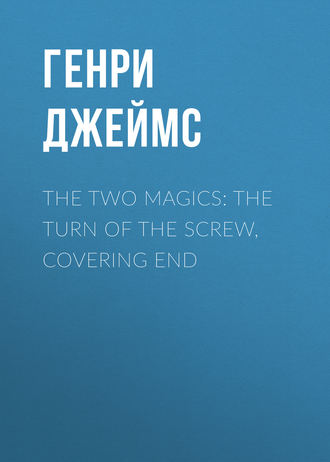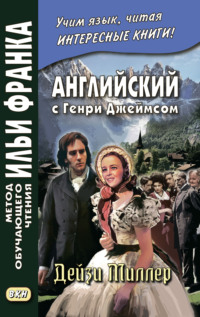 полная версия
полная версияThe Two Magics: The Turn of the Screw, Covering End
She held him off, across the hall, for a time almost out of proportion to the previous wait he had just made so little of. Then at last also, when she answered, it might have passed for a plea for further postponement, even for a plea for mercy. “Ah, Captain Yule–!” But she turned suddenly off: the flower had been nipped in the bud by the re-entrance of Chivers, at whom his master veritably glowered.
“What the devil is it?”
The old man showed the shock, but he had his duty. “Another party.”
Mrs. Gracedew, at this, wheeled round. “The ‘party up’!” It brought back her voice—indeed, all her gaiety. And her gaiety was always determinant. “Show them in.”
Clement Yule’s face fell while Chivers proceeded to obey. “You’ll have them?” he wailed across the hall.
“Ah! mayn’t I be proud of my house?” she tossed back at him.
At this, radiant, he had rushed at her. “Then you accept–?”
Her raised hand checked him. “Hush!”
He fell back—the party was there. Chivers ushered it as he had ushered the other, making the most, this time, of more scanty material—four persons so spectacled, satchelled, shawled, and handbooked that they testified on the spot to a particular foreign origin and presented themselves indeed very much as tourists who, at an hotel, casting up the promise of comfort or the portent of cost, take possession, while they wait for their keys, with expert looks and free sounds. Clement Yule, who had receded, effacing himself, to the quarter opposed to that of his companion, addressed to their visitors a covert but dismayed stare and then, edging round, in his agitation, to the rear, instinctively sought relief by escape through the open passage. One of the invaders meanwhile—a broad-faced gentleman with long hair tucked behind his ears and a ring on each forefinger—had lost no time in showing he knew where to begin. He began at the top—the proper place, and took in the dark pictures ranged above the tapestry. “Olt vamily bortraits?”—he appealed to Chivers and spoke very loud.
Chivers rose to the occasion and, gracefully pawing the air, began also at the beginning. “Dame Dorothy Yule—who lived to a hundred and one.”
“A hundred and one—ach so!” broke, with a resigned absence of criticism, from each of the interested group; another member of which, however, indicated with a somewhat fatigued skip the central figure of the series, the personage with the long white legs that Mrs. Gracedew had invited the previous inquirers to remark. “Who’s dis?” the present inquirer asked.
The question affected the lovely lady over by the fireplace as the trumpet of battle affects a generous steed. She flashed on the instant into the middle of the hall and into the friendliest and most familiar relation with everyone and with everything. “John Anthony Yule, sir,—who passed away, poor duck, in his flower!”
They met her with low salutations, a sweep of ugly shawls, and a brush of queer German hats: she had issued, to their glazed convergence, from the dusk of the Middle Ages and the shade of high pieces, and now stood there, beautiful and human and happy, in a light that, whatever it was for themselves, the very breadth of their attention, the expression of their serious faces, converted straightway for her into a new, and oh! into the right, one. To a detached observer of the whole it would have been promptly clear that she found herself striking these good people very much as the lawful heir had, half an hour before, struck another stranger—that she produced in them, in her setting of assured antiquity, quite the romantic vibration that she had responded to in the presence of that personage. They read her as she read him, and a bright and deepening cheer, reflected dimly in their thick thoroughness, went out from her as she accepted their reading. An impression was exchanged, for the minute, from side to side—their grave admiration of the finest feature of the curious house and the deep free radiance of her silent, grateful “Why not?” It made a passage of some intensity and some duration, of which the effect, indeed, the next minute, was to cause the only lady of the party—a matron of rich Jewish type, with small nippers on a huge nose and a face out of proportion to her little Freischütz hat—to break the spell by an uneasy turn and a stray glance at one of the other pictures. “Who’s dat?”
“That?” The picture chanced to be a portrait over the wide arch, and something happened, at the very moment, to arrest Mrs. Gracedew’s eyes rather above than below. What took place, in a word, was that Clement Yule, already fidgeting in his impatience back from the front, just occupied the arch, completed her thought, and filled her vision. “Oh, that’s my future husband!” He caught the words, but answered them only by a long look at her as he moved, with a checked wildness of which she alone, of all the spectators, had a sense, straight across the hall again and to the other opening. He paused there as he had done before, then with a last dumb appeal to her dropped into the court and passed into the garden. Mrs. Gracedew, already so wonderful to their visitors, was, before she followed him, wonderful with a greater wonder to poor Chivers. “You dear old thing—I give it all back to you!”









